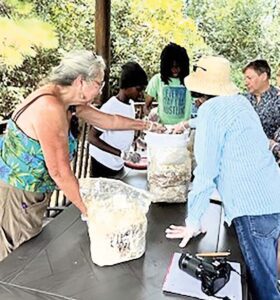The Environmental Education Association of South Carolina (EEASC) is a nonprofit providing natural resource conservation education in South Carolina. EEASC is affiliated with the Southeastern Environmental Education Alliance, which is part of the North American Association of Environmental Education (NAAEE), a national nonprofit founded in 1971. NAAEE operates in 56 states and 30 countries, with more than 30,000 members involved.
One of the newer recurring projects for EEASC is the Midlands Meetup, an organized monthly gathering designed to educate and invigorate students, conservation activists, and regular people. This event began in October 2016, with a Meetup at Sonoco Recycling.
Last month’s event was held at Locklair’s Farm Supply in Gaston. The visit featured Locklair’s Permaculture Homestead, where folks work with nature and not against it. Attendants visited the functional food forest and learned about polyculture and other means of working with nature.
The October EEASC Meetup is scheduled to be held at Interlaken Wildlife Center in Cameron, S.C. October 14 at 5 p.m. The Interlaken Wildlife Center is a 2,200-acre hunting and wildlife preserve located one mile north of Cameron, South Carolina, in Calhoun County.
The property includes a mixture of ponds, agricultural fields, and beautiful mature pinewoods with clear understory– classic bobwhite quail shooting habitat. Four Hole Swamp, a small blackwater tributary of the Edisto River, begins on and runs through the middle of the Interlaken property as it flows 75 miles south to the Edisto. Abundant wildlife includes bobwhite quail, ducks, dove, whitetail deer, wild turkeys, and fox squirrels.
The September event was scheduled to be held at Uhuru Farms Sustainability Institute (UFSI), located in Hopkins. UFSI is a sustainability and cultural education center in Hopkins that focuses on growing food and promoting Afro-Indigenous and Gullah Geechee traditions. Uhuru Farms is associated with UASC International, which operates the Uhuru Academy and focuses on education, building sovereign spaces, growing food, and investing in the community.
Iya Kiauntae Washington Infinite is the director of Institutional Advancement at UFSI. She says that her mother is responsible for her being in this position. “We were raised in the suburbs as part of military families. No one grew food. They had award-winning lawns. My mother always operated a home day care center and preached the idea that nutrition was the center of education.”
Asked what her organization does, she says, “We have festivals and invite schools and day care centers to the grounds. We teach a STEAM curriculum and the A isn’t just Art, it’s also Agriculture.”
“When we decided to get the children involved we followed the Green Steps program that EEASC offers where children are learning, doing, and teaching others about their projects. That’s what we’re doing here today.” The Uhuru Farms Sustainability Institute Mission is To Be a Model for Sustainability.
UFSI is linked to Purple Mushroom Farms like so many other groups. “At a farm event someone asked if I knew of Purple Mushroom Farms. After meeting Tatrina we started using its mushroom packages for all our needs,” says Kiauntae.
Packs of mushroom kits with Purple Mushroom branding sits on several tables under the on-site veranda at UFSI. Five gallon buckets with predrilled holes and protective gloves are passed around as Resident Mycologist Kadedra Yass’e introduces the young scholars from Uhuru Farms who will guide participants in cultivating Pink Oyster Mushrooms using those buckets.
In small groups of four or five people, participants are led through the mushroom-growing process step by step, using a sterilized straw, and pink oyster mushroom spores. Each group works together, under student supervision, layering the straw and spores (just like making lasagna) to create the perfect growing environment.
After several return trips to the straw container and mixing and layering the ingredients to suit the young but demanding instructors, each bucket had a finished product ready to grow mushrooms. And each participant had new knowledge of the mushroom growing process.
Kiauntae says the most important part of this interaction is, “recognizing the ability for young ones to feel what it means to be stewards of the land. When you take care of the land, it takes care of you.”
For more information, visit eeasc.org, www.uascinternational.org/uhuru-farms, or www.uascinternational.org.



Loading Comments